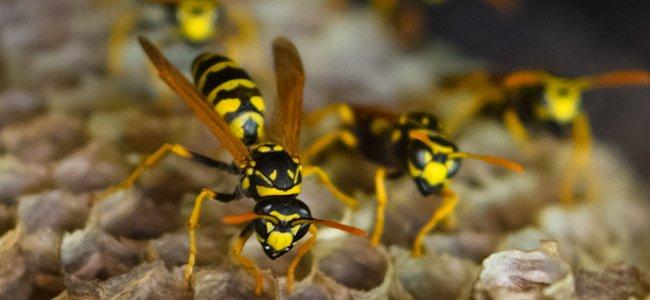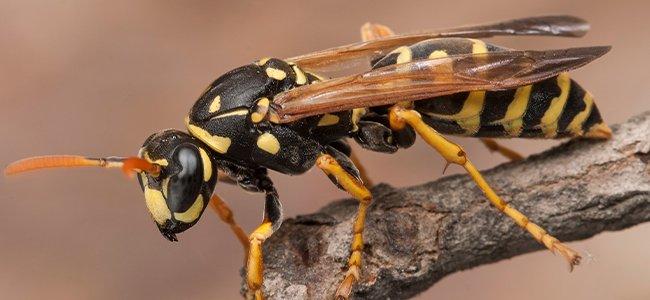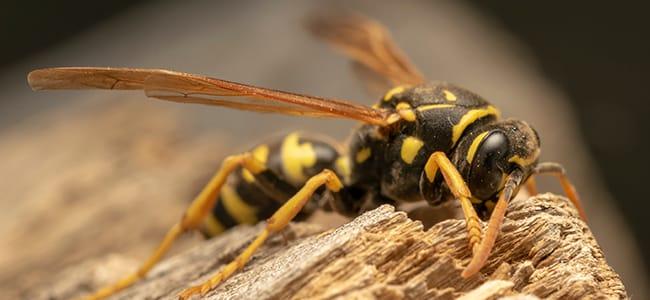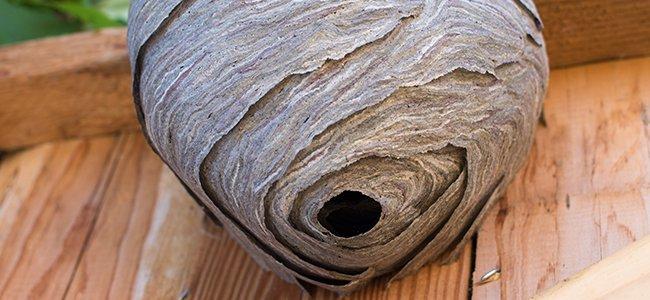
How To Keep Wasps Away From Your Washington D.C. Yard
08/23/2021
Stinging insects are extremely dangerous pests here in Washington D.C. For aggressive varieties such as wasps, home and business owners find themse...
READ MORE >
For many of us, it’s not easy to say goodbye to summer. With all the grilling, swimming, vacations and get togethers, it can be tough to see it end. But on the bright side, there will be fewer insects bugging you, right? Not necessarily. Some of those insects that have been driving you buggy all summer actually get worse in the fall months.
One of the insects that’s at their peak in the fall are yellow jackets. Yellow jackets have been busy working all summer long to grow their nests. In the fall months, queen yellow jackets are out looking for a place to spend the winter while they are pregnant. Sometimes that is in the ground in fallen leaves or in the hollow of trees. They will come out in the spring, build nests of their own and to lay eggs. The fertile males and the workers are essentially homeless after the future queens leave the next. They will eventually die, but in the meantime, they are trying to survive and searching for food. Since there can be up to 4,000 workers in a single colony, that is a lot of yellow jackets out fending for themselves.
This does not mean that you should assume any nest you see on or around your property is unoccupied. Yellow jackets do still live in their colony until they either die due to the elements or due to lack of food. A yellow jackets nest is made out of chewed up cellulose which looks like paper. Nests can often be found in the ground, in piles of leaves, in holes in trees and in eaves of homes.
The types of foods that yellow jackets enjoy the most are similar to what you like to eat. They feed on sweets and proteins and they are really big fans of sugary drinks. Any of your end of summer cookouts are likely to be visited by a few yellow jackets since their populations are so high. Because they are pretty much fighting for their survival all the time, the territorial instinct they have to protect their colony and their nest is also heightened. That means yellow jackets tend to be more likely to sting in the fall than they are in the summer.
Unlike some other stinging insects who sting once and then their stinger falls off, yellow jackets can sting repeatedly. Some who do not show any allergy symptoms when they get stung by other stinging insects do when it comes to yellow jackets because of the volume of stings. Allergic reactions can be serious and you should seek medical attention immediately if you experience swelling of your tongue, difficulty breathing, hives, dizziness or a rapid pulse.
Generally speaking, if you get stung, you can expect it to be painful (of course), and you can also expect some minor swelling or redness around the sting. Like most insects, it can be tough to eliminate them entirely as they are capable of flying. The good news is that there are some things you can do around your property to make it a little less appealing to yellow jackets and other stinging insects.
Keep all trash and recyclables in covered bins as far away from your home and yard as possible.
Make sure any food you take outside is cleaned up before you go in and try to avoid leaving food or drinks outside and uncovered for any amount of time.
Make sure all of your windows and doors have good screens on them so yellow jackets won’t be able to get inside your home (if they get inside, they’ve got a cozy, warm place to spend the winter with plenty of food, so you definitely don’t want that to happen).
Rake up the leaves and other lawn debris to remove potential nesting sites.
When you are going to be outside, try to avoid wearing perfumes as it can attract hungry yellow jackets.
If you think you have a problem with yellow jackets or you see a nest on your property, you should not try to get rid of it on your own. Because yellow jacket stings can be so threatening, it is important to contact a pest control professional to eliminate yellow jackets and other stinging insect nests from your property.

08/23/2021
Stinging insects are extremely dangerous pests here in Washington D.C. For aggressive varieties such as wasps, home and business owners find themse...
READ MORE >

06/27/2021
Some pests are so harmless that you almost feel bad for getting rid of them. Wasps, on the other hand, only cause relief when they’re gone. S...
READ MORE >

04/09/2021
Keeping your yard a safe and pleasant place to spend time, free of wasps and hornets, doesn’t just happen by itself. It takes thought and act...
READ MORE >

09/30/2020
Spending time in your Maryland yard is one of the best things about living here. Whether you’ve created a backyard oasis or enjoy rocking on ...
READ MORE >

Protect your home and family from nuisance and potentially damaging pests with a Preferred Care home pest control plan. Starting at $49/month

Don't let the bed bugs bite a second longer. Contact American Pest for the most comprehensive bed bug control in the industry. Learn More

Our certified rodent control pros will put an end to your frustration by getting rid of rats and mice inside your home. Learn More

Say goodbye to wood-destroying termites in your home when you contact American Pest for expert termite control. Learn More

Trust American Pest to deliver professional backyard tick control services that are guaranteed to get results. Learn More

Don't spend the warm-weather season indoors, find out how American Pest's professional treatments get rid of mosquitoes. Learn More
Fill out the form and recieve feedback in less than 5 minutes. For immediate service please call.